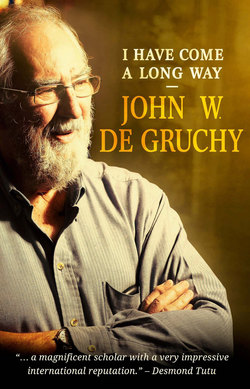Читать книгу I Have Come a Long Way - John W. de Gruchy - Страница 3
На сайте Литреса книга снята с продажи.
ОглавлениеFOREWORD
Emeritus Archbishop of Cape Town
Desmond Mpilo Tutu
The World Council of Churches (WCC) provoked the anger of the vast majority of white Christians in South Africa with its Programme to Combat Racism (PCR). This anger was stoked further by the grants the programme made to what the majority of blacks regarded as liberation movements and the nationalist Afrikaner government and most whites regarded as terrorism. The government wanted the churches to withdraw from membership of the WCC. The prime minister, Mr John Vorster, agreed to meet a delegation of church leaders to discuss this hot topic in August of 1970. To prepare for this crucial meeting, this delegation gathered at St. Peter’s Theological College – the Anglican seminary run by the Community of the Resurrection – in Rosettenville, a white suburb to the south of Johannesburg. John de Gruchy, working for the South African Council of Churches (SACC), was the organiser of the gathering. He invited me to give one of the Bible studies, and I think I met him then for the first time. As it happened, the meeting with Mr Vorster never took place. But little did we know back then that John would become such a magnificent scholar with a very impressive international reputation.
When I went to work for the much maligned WCC as an associate director of its Theological Education Fund based in Bromley, Kent, in the UK, I invited John to become a member of its Africa Committee, an invitation I was glad he accepted. He was at ease hobnobbing with rising theologians like himself from South America and Asia, as well as more established figures from the UK, Europe and North America. His stature as a theologian and writer, especially as an authority on Dietrich Bonhoeffer, was growing in quite a spectacular way. In my view, nothing attested to this more than the holding of the Seventh International Bonhoeffer Congress in Cape Town in 1996, thereby proclaiming that South Africa was no longer the world’s pariah state following the accession of Nelson Mandela as the first democratically elected president of a free South Africa.
John has held visiting professorships at prestigious universities overseas and given lectures in many of them. At home he was a professor of Christian Studies and held the Robert Selby Taylor Chair at the University of Cape Town. He was sought-after as a lecturer, both in South Africa and in many other parts of the world. His rise was indeed amazing and meteoric. We could not have imagined anything so electrifying when we sat in the garden of St. Peter’s College all those many, almost light years ago.
Isobel, his wife, was meanwhile carving out a niche for herself as a writer and publisher of poetry, and as a painter. John’s autobiography quotes from this poet at some significant moments in their lives. They are a remarkable couple, these descendants of immigrants from France and Jersey, England, Cornwall and Germany. After a very full life, they intended to enjoy the quieter pace at Volmoed, a community that offers retreats and opportunities for personal growth and renewal.
But their bliss was shattered by the death by drowning of their son Steve, who had been prominent in the anti-apartheid struggle, and who had followed John as a writer, teacher and theologian. Isobel lost a loving and beloved son. John lost a son and a theological colleague and collaborator, with whom he was planning another joint publication. Isobel turned to her poetry and painting to find solace and healing. Contemplating such a devastating loss, John wrote Led into Mystery to try to produce a satisfying theodicy.
I believe John has spent many a long hour churning over and over again: “If only.” He is not the man he would have been had Steve been alive. I think he weeps often; it has been a shattering and devastating loss for them, and for us. What he has said about facing such a traumatic experience has helped to help others. And for this we give thanks to God. Many of us also give thanks for John’s intellectual brilliance and outstanding scholarship. But most of all, I give thanks for the humility of revealing his vulnerability.
